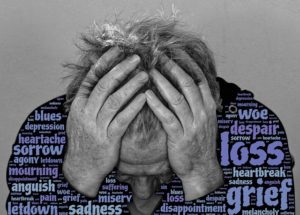“I was really struggling with getting through day to day activities after the passing of my significant other. I felt stuck and lost in a sea of emotions. I began to feel nothing for months and thats when I knew I need to seek help. Seeing Skye for grief therapy helped me overcome and restart my life” – L.R.
 Grief can be a deep mental suffering that can overcome your daily lifestyle. A loved ones death, divorce, or major changes in lifestyle are just a few common causes. A common emotion to feel while grieving is Anxiety. Anxiety can develop from all the stressors that occur after the loss of a loved one or severe life changes. Common stressors can be: funeral plans, financial changes, moving homes, and job changes. Change in general can be hard to manage, but when a change comes unexpectedly is when it can become over bearing. You are not crazy; everyone can experience the five stages of grief and it can affect individuals differently.
Grief can be a deep mental suffering that can overcome your daily lifestyle. A loved ones death, divorce, or major changes in lifestyle are just a few common causes. A common emotion to feel while grieving is Anxiety. Anxiety can develop from all the stressors that occur after the loss of a loved one or severe life changes. Common stressors can be: funeral plans, financial changes, moving homes, and job changes. Change in general can be hard to manage, but when a change comes unexpectedly is when it can become over bearing. You are not crazy; everyone can experience the five stages of grief and it can affect individuals differently.
- Denial: This is the first stage of Grief. In this stage, you may feel very overwhelmed. Denial can also come with a state of shock, especially if the event was unforeseen. Some symptoms of denial can be the feelings of numbness, at a loss, and confusion. Denial can be harmful, because it can cause you to ignore problems instead of finding solutions.
- Anger: This is the second stage of Grief. Anger is an emotion that can easily overbear your mental health. Some causes of anger can be feelings of desertion and abandonment. Anger can be harmful to you, your family, and any other loved ones.
- Bargaining: This is the third stage of Grief. Bargaining can be described as a temporary truce. You may feel yourself pleading for a tragedy to change or to never happen. Guilt and the “if only” questions tend to find their ways into this complicated and overwhelming situation, but you need to be gentle with yourself. Life may bring events into your life that you could never expect, and putting the weight of guilt on your shoulders can only make it worse.
- Depression: This is the fourth stage of Grief. The feelings of guilt and bargaining can quickly turn into depression. Some signs of depression can be the feelings of worthlessness, emptiness or brokenness. Depression can be harmful to you, because you can forget how important you truly are to this world.
- Acceptance: This is the fifth and final stage of Grief. The title ‘Acceptance’ may misled you, because most people believe acceptance means that you are okay with a tragedy or life change. Acceptance means you can mental accept the new change in your life, but this does not mean you may not still feel sad or angry about the life change. We want to let you know that it is natural to still feel these emotions even though you may have accepted the change in your life.
Life is unpredictable and grief will come when tragedies hit. I can help you manage and work through all the different emotions and stages of grief. Life changes and tragedies can feel impossible to managed, but at Skyehelps we can provide therapeutic methods that can help you overcome the burden of Grief and become a stronger person.
Everyone is Different and that’s Okay!
Everyone can experience grief differently. The type of grief, personality and age can also have an effect on how you may be experiencing grief. We all experience the stages in different time lengths. It is natural to be in different stages of grief for different amounts of time. It is also natural to experience many different emotions throughout the stages.
Common signs to help recognize Grief in children:
- Separation anxiety: a child may become have trouble saying good-bye or leaving loved ones after visiting in fear of not seeing them again.
- Regression: a child may revert to bed wetting or thumb sucking to offer comfort to themselves.
- Impatience: a child may become frustrated or angry during normal day-to-day activities.
- Withdrawal: a child may start to separate from friends or family, and may show little to no emotion.
- Inattentive: a child may show a decrease in focus at school or home.
- Protectiveness- a child may being to act protective of siblings, friends, or toys.
Different types you may be experiencing:
- Anticipatory Grief– A common way this type of grief can be experienced is when a loved one’s health stars to deteriorate. You may begin to anticipate future tragedies, which causes grief to occur.
- Delayed Grief– Emotions from a life change or tragic event can be postponed until a later time. Delayed grief can occur when a traumatic event happens and emotions may get suppressed and come out at a later time.
- Prolonged Grief– This type of grief mimics the natural five stages of grief, but this type can typically last longer than usual. It is natural to experience prolong grief, especially if a traumatic event occurs unexpectedly.
- Traumatic Grief– Traumatic grief can also occur from unexpected tragedies. Symptoms of experiencing traumatic grief may be: Self-destructive behavior, guilt, low self-esteem, suicidal thought, violent outburst, or radical life style changes.
- Disenfranchised grief– This type of grief can be common when you experience the loss of an ex-spouse, pet, co-worker, etc. You may feel sad about the loss of a person even though they may not have a big impact on your life.
- Chronic Grief– You may be experiencing chronic grief through many different emotions, but the most common is the feeling of hopelessness. Chronic grief can be harmful if left untreated, because in many cases it can develop into clinical depression.
As you can see there are many different stages and types of grief you can experience after severe life changes or any traumatic event. You are not crazy. We are here to help you manage and cope with the different types of grief or stages you may be feeling.
Don’t let it take over your life, Begin Healing today!
Click here to request an appointment or Call 706-864-5674.
LocationS
Dahlonega, GA
Find the SkyeHelps private counseling offices on the second floor of the Sargent Building on the Square.
72 Public Square N., Ste. B
Dahlonega, GA 30533

